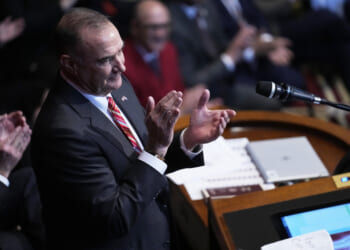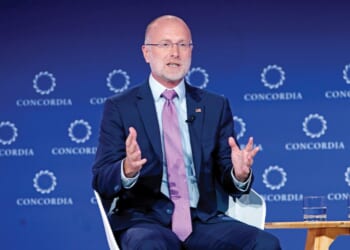When DOGE dug into the financial tentacles of USAID, it found troubling examples of overspending and funding of unchecked, woke programs outside the agency’s mission. At the now defunded Corporation for Public Broadcasting (CPB) a similar Gordian knot of spending patterns has diverted millions of dollars from broadcasting content to the public, enriched elite nonprofit leaders, and wedged public television (PBS) and public radio (NPR) into producing left-leaning content.
With the passing of the Big Beautiful Bill, Congress gave CPB no funding at all — a shock for CPB, which was expecting $1.07 billion for 2026 and 2027.
As The Federalist previously reported, CPB is a nonprofit created by Congress in 1967 to administer funding for public radio and television stations. It has many highly paid employees in Washington, D.C., and an elderly CEO, Patricia Harrison, 86, who received $524,000 in compensation in 2022, according to the CPB’s most recently available 990 tax exempt form.
CPB announced on Aug. 1 that it will both “wind-down” operations and advocate for Congress to restore funding. The defunding will be felt by the many nonprofits that received money from CPB or that exist because of public broadcasting. One of them is the Association of Public Television Stations (APTS).
Taxpayer-Funded Lobbying
APTS is a $4.5 million nonprofit membership organization that promotes public television. Its finances are closely connected to APTS Action Inc., the lobbying arm of APTS, which is also funded by membership fees and shares the same leadership team. APTS Action had nearly $2 million in gross receipts in 2023. APTS Action advocates for policy issues related to education, health care, and telecommunications, and it “brings public television’s message to Capitol Hill.” It lobbies for “federal funding for America’s public television stations” and “expanding” public TV “outreach in education, public safety and civic leadership,” according to its tax-exempt papers.
APTS received $25,000 from CPB in 2022, and it charges public television stations a membership service fee. For an added fee, members can buy access to a grant-seeking database.
In 2023 APTS earned $3.8 million in “program service revenue,” which includes fees from public TV stations, and spent most of it on employee compensation ($3.3 million).
The path of money — from taxpayers to the federal government to CPB to public television stations to APTS, (or direct from CPB to APTS) — shows that ultimately taxpayers fund APTS, which appears to be primarily a fat salary and lobbying machine.
That would be like a parent (Congress) giving his kid (CPB) an allowance and the kid pocketing some of the money (salaries), giving the rest to some other kids (public television stations) who each pocket some of the money (salaries and operations) and pass along the rest to another kid (APTS) who pockets most of the money (salaries) and comes back to the parent (Congress) to ask for more money.
APTS’s former president and CEO, Patrick Butler, received a $766,000 compensation package in 2023, according to the APTS 990 tax-exempt form. He retired in 2024.
Kate Riley replaced Butler as APTS CEO in September 2024. It is unclear what her current salary is, but in 2023, she was APTS vice president, leading its government and public affairs department. She received $280,886 that year and likely has received a bump in pay to fill the top job at the nonprofit.
The Federalist asked APTS Senior Director of Communications Stacey Karp (2023 compensation $174,000) in an email why government-funded television stations require lobbyists to talk to the government, and, if public television stations are operating on a shoestring, why charge them a membership fee? The Federalist also asked how APTS explains the high salaries of its leadership team? In 2023, employee salaries accounted for roughly two-thirds of APTS’s total budget. Karp did not respond.
Culture-Shaping Grants
For a a fee of $3,200 per year, APTS member stations can access the grant center to find private funding to produce programming projects. The amount available is mindboggling for those willing to produce the right kind of content — that is, far left propaganda.
“Every year, foundations make over $1.6 million in media grants and there are nearly $50 million in federal grants each year, specifically to public media,” according to the APTS website. The problem is, foundations with woke agendas will only pay for content that advances their perspective. Combine the far-left leanings of many PBS funders with its biased news coverage and viewers get a myopic view of America. Public broadcasting should reflect the voices of the entire nation. That is not happening.
Below are a few examples of the foundations funding projects for public broadcasting and recent projects that may or may not run on public television. This list shows the areas of interest these foundations request filmmakers work in to receive funding.
Independence Public Media Foundation (IPMF) will fund film projects that promote left-wing perspectives on racism, the LGBT ideology, prisoners, and people with disabilities.
Recently funded projects include:
Hollywood Does Abortion, which looks at “50 years of abortion on screen, revealing how flawed portrayals contribute to a climate where abortion remains an embattled right and access to this medical procedure dwindles.”
Together We Grow, features “a mixed-race gay couple in Philadelphia, and their 7-year-old son Bryan,” and their effort to “grow culturally important seeds” and “fight for food justice.”
To Springfield with Love, a documentary about Haitian immigrants, “challenging xenophobic rhetoric.” The film will “tell individual immigrant stories and culminate with stories from Springfield, OH, and Charleroi, PA, where Haitian communities continue to face hostility.”
White Meat: Appetizer, “a narrative film about the buried bodies of hundreds of enslaved people that lie beneath Philadelphia’s Washington Square Park. What if, one night, they all came back as zombies, but they only ate white people?”
Far left leaning Democracy Fund donated $247,000 to Independence Public Media Foundation in 2023.
The Arthur Vining Davis Foundations “currently fund in five areas: Private Higher Education, Public Educational Media, Interfaith Leadership and Religious Literacy, Palliative Care, and Environmental Solutions.”
Some of its recently funded projects include:
Crime and Punishment in America, a four-part documentary exploring the “consequential story of criminal justice in America from the colonial era to today.”
Islam’s Greatest Stories of Love, a film designed to “counter bigotry and create peace through the media.”
Emancipation to Exodus, an eight-hour series that examines the black experience from the Emancipation Proclamation to post World War II.
The Arthur Vining Davis Foundations also help fund Press Forward, described as “a national coalition investing more than $500 million to strengthen local newsrooms, close longstanding gaps in journalism coverage, advance public policy that expands access to local news, and to scale the infrastructure the sector needs to thrive.” Press Forward’s management committee includes current and former representatives from the left-leaning Knight Foundation, Democracy Fund, and Just Democracy.
The Ford Foundation’s JustFilms, whose productions are often featured on PBS, funds films that “creatively intersect with the social justice issues.” Some of its recently funded projects include:
All Other Parts, a documentary about the effect of “deportation and incarceration on a family.”
Way of Life, a film set in a rural community centered “around one of Montana’s only abortion and trans health care clinics, following organizers working to shape the state’s political future.”
The Inquisitor, a documentary to “explore and reconsider the essence of democracy through the intricate layers of race, power, and representation in American society.”
Beth Brelje is an elections correspondent for The Federalist. She is an award-winning investigative journalist with decades of media experience.















